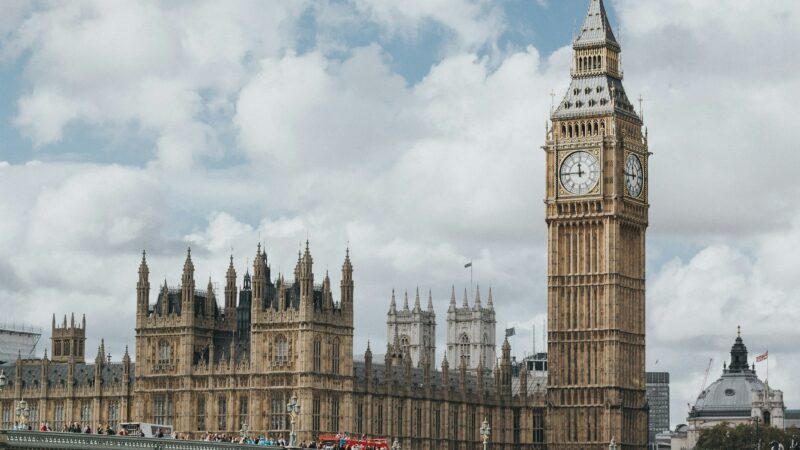According to recent polling by YouGov, a measly 1% of 18- to 24-year-olds plan to vote Conservative at the next general election. Having won roughly 20% of this demographic in the 2019, the Conservative Party has lost 95% of its support amongst Britain’s youngest voters in less than four years.
In reaction to this collapse in support, journalists and commentators have taken to rehashing the same talking-points regarding Tory ineptitude and how to resolve it – build more houses, be more liberal, have younger parliamentarians, and so on.
I don’t intend to add this ever-growing pile of such opinion pieces. Instead, I want to put Tory ineptitude into perspective, in hopes of undermining the entrenched and parochial coping of Britain’s right leaning politicians and commentariat.
Even though Churchill didn’t coin the phrase, right-leaning talking-heads maintain that “if you’re not a liberal at 20 you have no heart, if you’re not a conservative at 40 you have no brain”, even if not articulated as such; the progressive and liberal tendencies of the young are annoying, but natural and inevitable.
Of course, this is simply not true. Thatcher won the most support from 18- to 24-year-olds in 1979 and 1983, something which left-wing and right-wing critics are more than happy to point out, yet such doubters of the Iron Law of Liberal Youth have managed to reinvent the law, albeit without the caveat of an inevitable turn to the right in later life.
Socialists and capitalists don’t agree on many things, but they are united by the belief that Britain’s youth is a bastion of progressive leftism, marching in lock-step with other first-time voters around the world. In the former, this inspires great confidence; in the latter, this inspires a sense of foreboding.
Other commentators have blamed Brexit, which is also wrong. Despite the widely-cited age-gap between the average Remainer and Leaver, the UK’s relationship with the EU is pretty far down the average young person’s list of political priorities, hence why almost every avid post-Brexit remainer is a terminally online geriatric. Ironically, The Data from the British Election Study predicted a gradual increase in support for the Conservatives amongst Britain’s younger voters between 2015 and 2019.
Any person that has met the new cohort of young conservatives will attest their nationalistic and socially conservative modus operandi. Having its failures on crime and immigration reduction broadcast across the nation, its unsurprising that such people would lose faith in the Conservative Party’s ability to govern as a conservative party.
Indeed, given the Conservative Party’s eagerness to hold onto the Cameronite ‘glory days’ of tinkering managerialism, interspersed with tokenistic right-wing talking-points (i.e., the things which actually matter to the conservative base) its little wonder that the Tories have failed to win the young.
The Conservative Party Conference has a less than palatable reputation, but when the bulk of events revolve around uninformed conversations about tech, financial quackery, achieving Net Zero and lukewarm criticisms of The Trans Business, it is unsurprising so many Tory activists choose to preoccupy themselves with cocaine and sodomy.
Contrast this with the European continent, where right-wing populist parties are doing remarkably well with a demographic the Tories have all but officially dismissed. In the second round of France’s 2022 presidential election, incumbent president Emmanuel Macron, a centrist liberal europhile, was re-elected for a second term, with more than 58% of the vote. Although Macron obtained the majority of 18 to 24 years old who voted, it was over 60s which provided the backbone of his re-election, acquiring roughly 70% of their votes.
Moreover, whilst she was most popular with older voters (50- to 59-year-olds), the right-wing Marine Le Pen secured a sizeable portion of voters across all age brackets, especially those aged between 25- and 59- years old, filling the chasm left-behind by Macron’s near monopolisation of France’s oldest citizens.
These patterns were generally replicated in the first round of voting, although the far-left Melenchon garnered the most support from France’s youngest voters. At first glance, most right-leaning commentators would flippantly dismiss the wholesale liberal indoctrination of the youth, overlooking the astonishing fact that roughly 25% of France’s youngest voters support right-wing nationalism, whether that be Marine Le Pen or Eric Zemmour.
Due to growing suspicion of the two main parties in Germany, the centre-right Christian Democratic Union (CDU, otherwise known as Union) and the centre-left Social Democratic Party (SPD), third parties have gained support from the disaffected young, such the centre-left Greens, the centre-right Free Democratic Party (FDP) and the right-wing Alternative for Germany (AfD).
Whilst it’s not doing as well as the Greens with first-time voters on the national stage, the AfD is making strides at the federal level and is doing noticeably well with Germans in their 30s, which isn’t insignificant in a country with a median age of 45. Compare this to Britain’s Conservatives, who start to faulter with anyone below the age of 40!
Moreover, the AfD is effectively usurping the CDU as the main right-leaning political force in many parts of Germany. For example, the AfD was the most popular party with voters under 30 in the CDU stronghold of Saxony-Anhalt during the last state election, a forebodingly bittersweet centrist victory.
Similarly, Meloni’s centre-right coalition, dominated by the nationalist Brothers of Italy party, didn’t lead amongst the nation’s youngest voters (18 to 34 years old), but they came extremely close, gaining 30% of their votes compared to the centre-left coalition’s 33% – and won every other age bracket in the last general election. Again, not bad for a country with a median age just shy of 50.
Moreover, these trends transcend Western Europe, showing considerable signs of life in the East. Jobbik, the right-leaning opposition to Viktor Orban’s right-wing Fidesz party, is highly popular party with university students, and despite losing the recent election, Poland’s right-wing Law and Justice party obtained roughly a third of first-time votes in the election four years prior.
Roughly a quarter of first-time voters in Slovakia opted for the People’s Party-Our Slovakia, a far-right party with neo-Nazi roots, and roughly 35% of Bulgarian voters between 18- and 30-years-old voted for the right at the last parliamentary election, centre-right and far-right included.
Evidently, the success of right-wing nationalism amongst young voters across Europe, isn’t confined to republics. In addition to its republics, European constitutional monarchies, such as Sweden, Norway, and Spain, have materialised into right-wing electoral success.
The Moderate Party, Sweden’s main centre-right political force, won the largest share of voters aged by 18- and 21-years-of-age, with the insurgent right-wing Sweden Democrats placing second amongst the same demographic, coming only a few points behind their centre-right recipients of confidence-and-supply in government.
Further broken down by sex, the Sweden Democrats were distinctly popular with young Swedish men, and tied with the Social Democrats as the most popular party with Swedish men overall. Every age-bracket below 65-year-old was a close race between the Social Democrats and the Moderates or the Sweden Democrats, whilst those aged 65 and over overwhelmingly voted for the Social Democrats.
Similar to the Netherlands, whilst the Labour Party and Socialist Left Party were popular among young voters at the last Norwegian general election, support for centre-right Conservative Party and right-wing Progress Party didn’t trail far behind, with support for centre-left and centre-right parties noticeably increasing with age.
Whilst their recent showing wasn’t the major upset pollsters had anticipated, Spain’s right-wing Vox remains a significant political force, as a national party and amongst the Spanish youth, being the third most popular party with voters aged 18- to 24-year-olds.
Erstwhile, the centre-right Peoples Party (PP) is the most popular party with voters between 18- and 34-year-old with the centre-left Spanish Socialist Workers’ Party (PSOE) drawing most of its support from voters aged 55 and older, especially voters over 75.
Still, it is easy to see how sceptics might blame our culture differences with the European continent on the right’s alleged inability to win over the young. After all, its clear youth politics is taken more seriously on the European continent. The JFvD, the youth wing of the right-wing Forum for Democracy (FvD) in the Netherlands, is the largest political youth movement in the Benelux. The JFvD regularly organises activities which extend beyond campaign drudgery, from philosophy seminars to beach parties. Contrast this to the UK, where youth participation begins and ends with bag-carrying and leafleting; the drudgery of campaigning is only interspersed by instances of sexual harassment and other degenerate behaviour.
However, this suspicion is just as easily put to rest when we compare Britain to the rest of the Anglosphere, especially New Zealand, Canada, and the United States of America.
In the run-up to New Zealand’s general election, polling from The Guardian indicated greater support for the centre-right National Party (40%) amongst voters aged 18- to 34-years than the centre-left Labour Party (20%), a total reversal of the previous election, defying purported trends of a global leftward shift amongst younger generations.
More to the point, support was not going further left, with the centre-left Labour-Green coalition accounting for 34% of millennial votes, compared to the centre-right coalition’s rather astounding 50%; again, a complete reversal of previous trends and more proof than any that so-called ‘youthquakes’ aren’t as decisive as commentators and activists would have us believe.
Despite Labour’s success with young voters in 2017 and 2019, when the voter turnout of younger generations is as abysmal as Britain’s, it’s not exactly a given that parties and individuals of a non-socialistic persuasion should abdicate Britain’s future to a dopey loon like Corbyn. The creed of Britain’s youth isn’t socialism, but indifference.
If anything, right-leaning parties are more than capable of producing ‘youthquakes’ of their own. In a time when the British Conservatives are polling at 1% with their native young, the Canada’s Conservative Party are the most popular party with, polling at around 40% with 18- to 29-year olds, and despite his depiction as a scourge upon America’s youth, Trump comfortably won white first-time voters in both 2016 and 2020. Perhaps age isn’t the main dividing line in the Culture War after all!
In conclusion, the success of the Conservative Party with younger voters does not hinge upon our electoral system, our constitutional order, our place in Europe or the Anglosphere. Simply put, the Tories’ inability to win over the young is not an inability at all, but the result of coping; a stubborn and ideological unwillingness motivated by geriatric hubris, disproven time and time again by the success of other right-wing parties across the Western world.



